Page 60 of 488
59
uu Child Safety u Safety of Infants and Small Children
Continued
Safe Driving
3. Put the head restraint to its upper-most
position, then route the tether strap
between the head restraint legs, and secure
the tether strap hook onto the anchor.
4.Go to step 6.
3. Lower
the head restraint to its lowest
position.
4. Route the
tether strap over the head
restraint. Make sure the strap is not twisted.
5. Secur
e the tether strap hook onto the
anchor.
6. Tighte
n the tether strap as instructed by the
child seat maker.
7. Make
sure the child seat is firmly secured by
rocking it forward and back and side to
side; little movement should be felt.
8. Make su
re any unused seat belt that a child
can reach is buckled, the lockable retractor
is activated, and the be lt is fully retracted
and locked.
Tether
Strap
Hook
Anchor
Outer positionOuter position
Tether
Strap
Hook
Anchor
Center positionCenter position
All models
Page 61 of 488
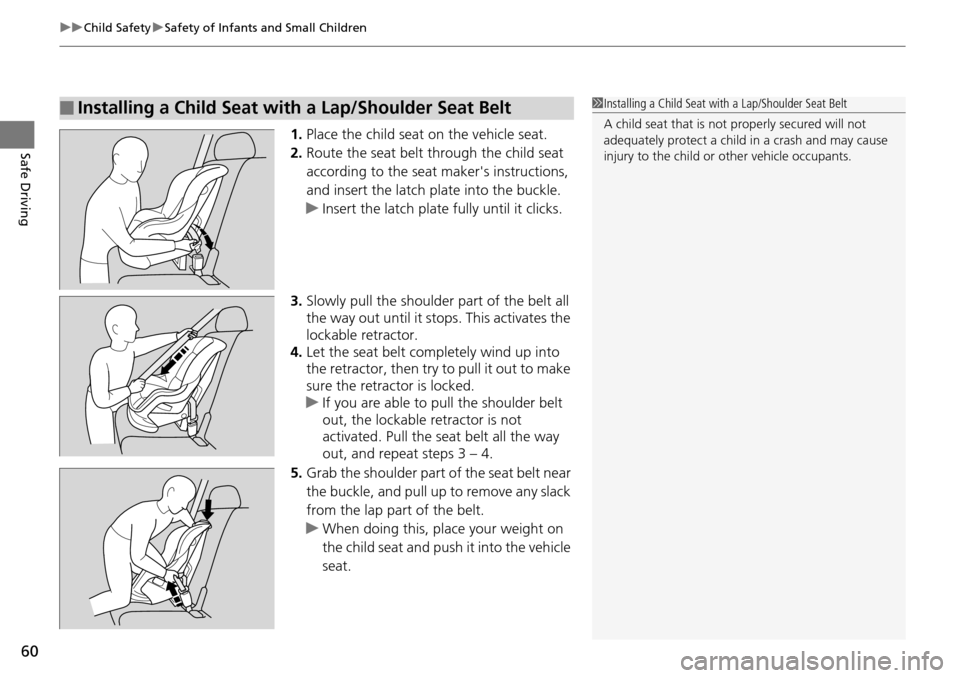
uu Child Safety u Safety of Infants and Small Children
60
Safe Driving1. Place the child seat on the vehicle seat.
2.Route the seat belt through the child seat
according to the seat maker's instructions,
and insert the latch plate into the buckle.
u Insert the
latch plate fully until it clicks.
3. Slo
wly pull the shoulder part of the belt all
the way out until it stops. This activates the
lockable retractor.
4. Let
the seat belt completely wind up into
the retractor, then try to pull it out to make
sure the retractor is locked.
u If you
are able to pull the shoulder belt
out, the lockable retractor is not
activated. Pull the seat belt all the way
out, and repeat steps 3 – 4.
5. Grab
the shoulder part of the seat belt near
the buckle, and pull up to remove any slack
from the lap part of the belt.
u When do
ing this, plac e your weight on
the child seat and push it into the vehicle
seat.
■Installing a Child Seat with a Lap/Shoulder Seat Belt1 Installing a Child Seat with a Lap/Shoulder Seat Belt
A child seat that is not properly secured will not
adequately protect a child in a crash and may cause
injury to the child or other vehicle occupants.
Page 62 of 488
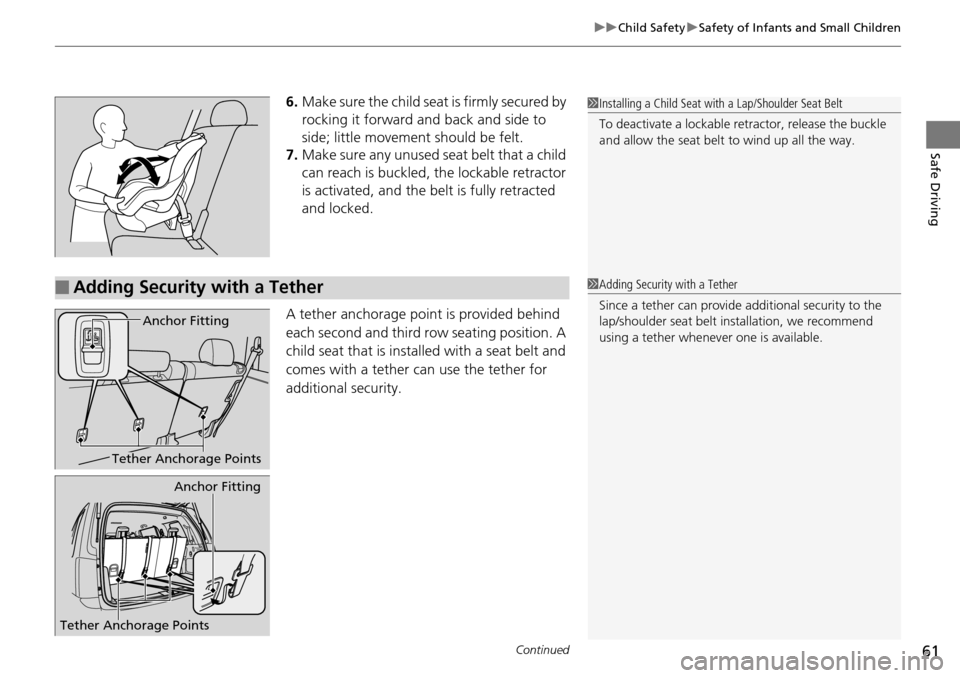
Continued61
uu Child Safety u Safety of Infants and Small Children
Safe Driving
6. Make sure the child seat is firmly secured by
rocking it forward and back and side to
side; little movement should be felt.
7.Make sure any unused seat belt that a child
can reach is buckled, the lockable retractor
is activated, and the be lt is fully retracted
and locked.
A tether anchorage point is provided behind
ea
ch second and third row seating position. A
child seat that is installed with a seat belt and
comes with a tether can use the tether for
additional security.
1 Installing a Child Seat with a Lap/Shoulder Seat Belt
To deactivate a lockable retractor, release the buckle
and allow the seat belt to wind up all the way.
■Adding Security with a Tether
Tether Anchorage Points
Anchor Fitting
Tether Anchorage Points
Anchor Fitting
1 Adding Security with a Tether
Since a tether can provide additional security to the
lap/shoulder seat belt in stallation, we recommend
using a tether whenever one is available.
Page 64 of 488
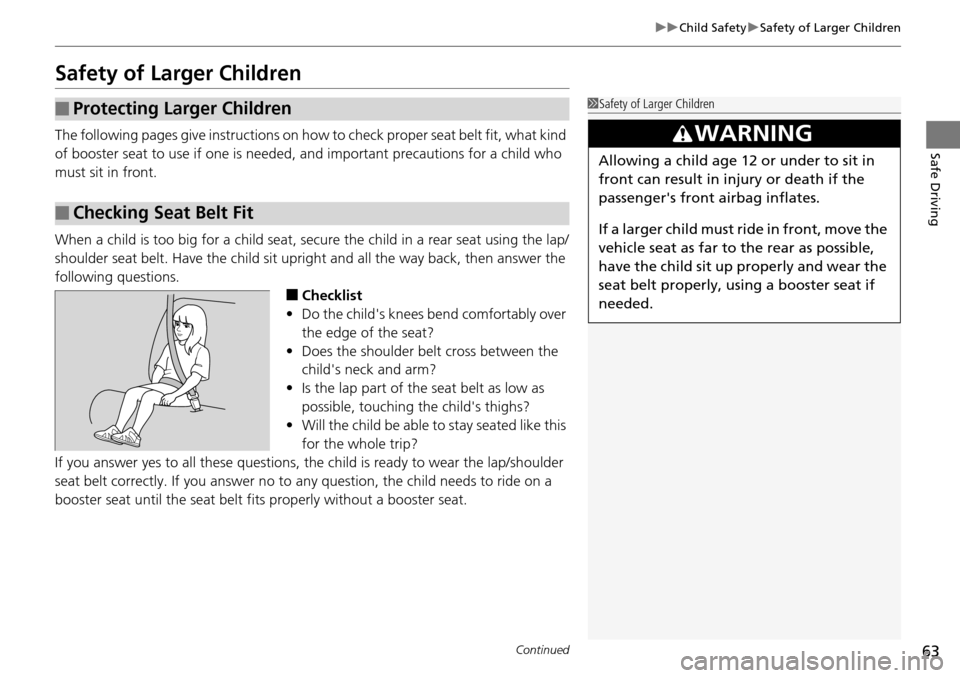
63
uu Child Safety u Safety of Larger Children
Continued
Safe Driving
Safety of Larger Children
The following pages give instructions on ho w to check proper seat belt fit, what kind
of booster seat to use if one is needed, and important precautions for a child who
must sit in front.
When a child is too big for a child
seat, secure the child in a rear seat using the lap/
shoulder seat belt. Have the child sit upri ght and all the way back, then answer the
following questions.
■Checklist
• Do
the child's knees bend comfortably over
the edge of the seat?
• Does the shoulder belt cross between the
ch
ild's neck and arm?
• Is
the lap part of the seat belt as low as
possible, touching the child's thighs?
• Will the child be able to stay
seated like this
for the whole trip?
If you answer yes to all these questions, th e
child is ready to wear the lap/shoulder
seat belt correctly. If you answer no to any question, the child needs to ride on a
booster seat until the seat belt fits properly without a booster seat.
■Protecting Larger Children
■Checking Seat Belt Fit
1 Safety of Larger Children
3 WARNING
Allowing a child age 12 or under to sit in
front can result in injury or death if the
passenger's front airbag inflates.
If a larger child must ri de in front, move the
vehicle seat as far to the rear as possible,
have the child sit up properly and wear the
seat belt properly, using a booster seat if
needed.
Page 65 of 488
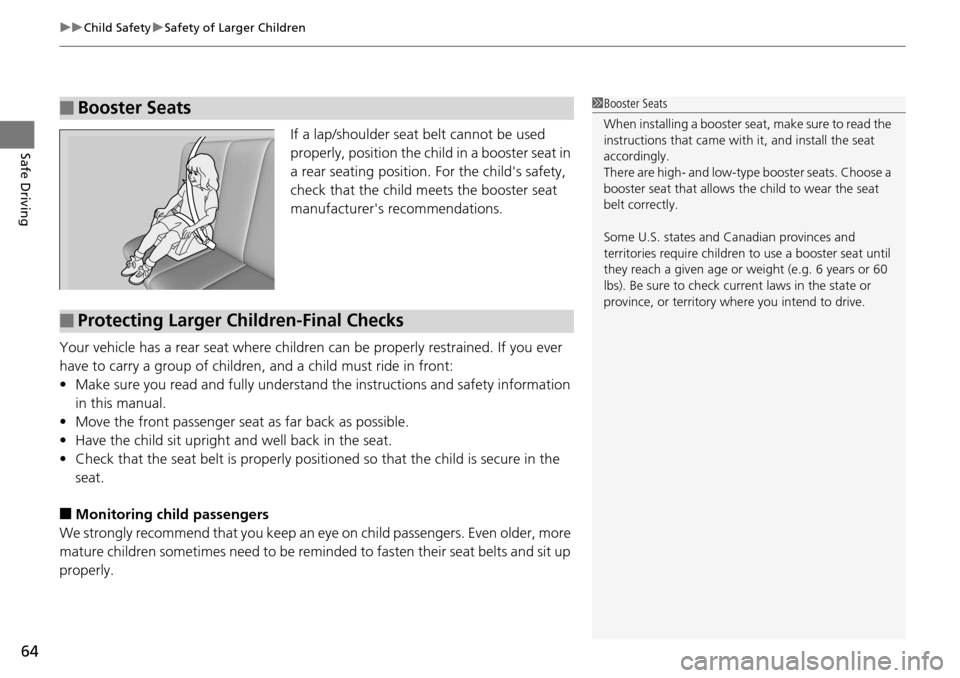
uu Child Safety u Safety of Larger Children
64
Safe DrivingIf a lap/shoulder seat belt cannot be used
properly, position the child in a booster seat in
a rear seating position. For the child's safety,
check that the child m eets the booster seat
manufacturer's recommendations.
Your vehicle has a rear seat where children can be properly restrained. If you ever
have to carry a group of children, and a child must ride in front:
• Make
sure you read and full y understand the instructions and safety information
in this manual.
• Mo
ve the front passenger seat as far back as possible.
• Hav
e the child sit upright and well back in the seat.
•Che
ck that the seat belt is properly positi oned so that the child is secure in the
seat.
■Monitoring child passengers
We strongly recommend that you keep an eye on child passengers. Even older,
more
mature children sometimes need to be remind ed to fasten their seat belts and sit up
properly.
■Booster Seats1 Booster Seats
When installing a booster seat, make sure to read the
instructions that came with it, and install the seat
accordingly.
There are high- and low-type booster seats. Choose a
booster seat that allows the child to wear the seat
belt correctly.
Some U.S. states and Canadian provinces and
territories require children to use a booster seat until
they reach a given age or weight (e.g. 6 years or 60
lbs). Be sure to check current laws in the state or
province, or territory where you intend to drive.
■Protecting Larger Children-Final Checks
Page 71 of 488

70
uu Indicators u
Instrument Panel
IndicatorNameOn/BlinkingExplanationMessage *
Transmission
Indicator
●Comes on for a few seconds when
you turn the ignition switch to ON
(w
, then goes off.●Blinks if the transmission system has a
problem.
●Blinks while driving - Avoid sudden
starts and acceleration and have the
vehicle checked by a dealer immediately.
Seat Belt
Reminder
Indicator
●Comes on and the beeper sounds if
you are not wearing a seat belt when
you turn the ignition switch to ON
(w
. If the front passenger is not
wearing a seat belt, the indicator
comes on a few seconds later.
●Blinks while driving if either you or
the front passenger has not fastened
a seat belt. The beeper sounds and
the indicator blinks at regular
intervals.
●The beeper stops and the indicator goes
off when you and the front passenger
fasten their seat belts.
●Stays on after you or the front
passenger has fastened the seat belt
- A
detection error may have occurred in
the sensor. Have the vehicle checked by a
dealer.
2 Seat Belt Reminder P. 30
Low Fuel
Indicator
●Comes on when the fuel reserve is
running low (approximately 2.8 U.S.
gal./10.8 Liter).
●Blinks if there is a problem with the
fuel gauge.
●Comes on - Refuel your vehicle as soon
as possible.
●Blinks - Have the vehicle checked by a
dealer.
* Not available on all models
Page 72 of 488

71
uu Indicators u
Continued
Instrument Panel
IndicatorNameOn/BlinkingExplanationMessage *
ABS (Anti-lock
Brake System)
Indicator
●Comes on for a few seconds when
you turn the igniti on switch to ON
(w
, then goes off.●If it comes on at any other time, there
is a problem with the ABS.
●Stays on constantly - Have the vehicle
checked by
a dealer. With this indicator
on, your vehicle still has normal braking
ability but no an ti-lock function.
2ABS (Anti-lock Brake System) P. 362
Supplemental
Restraint System
Indicator
●Comes on for a few seconds when
you turn the igniti on switch to ON
(w
, then goes off.●Comes on if a problem with any of
the following is detected:
-Supplemental restraint system
- Side air
bag system
-Side curtain
airbag system
-Seat belt tensioner
●Stays on constantly or does not come
on at all
- Have the vehicle checked by a
dealer.
VTM-4 ® System
Indicator *
●Comes on for a few seconds when
you turn the igniti on switch to ON
(w
, then goes off.●Comes on if there is a problem with
the VTM-4 ®.
●Blinks when the VTM-4 ® system is
overheated. The system is inactive.
●Stays on constantly - Have the vehicle
checked by
a dealer.
●Blinks while driving - The VTM-4® fl uid
temperature is too high. Stop in a safe
place, shift to
(P
, and idle the engine
until the indicator goes off. If the
indicator does not stop blinking, take
your vehicle to a dealer.
2 VTM (Variable Torque
Management)-4 r System * P. 354
—
* Not available on all models
Page 141 of 488
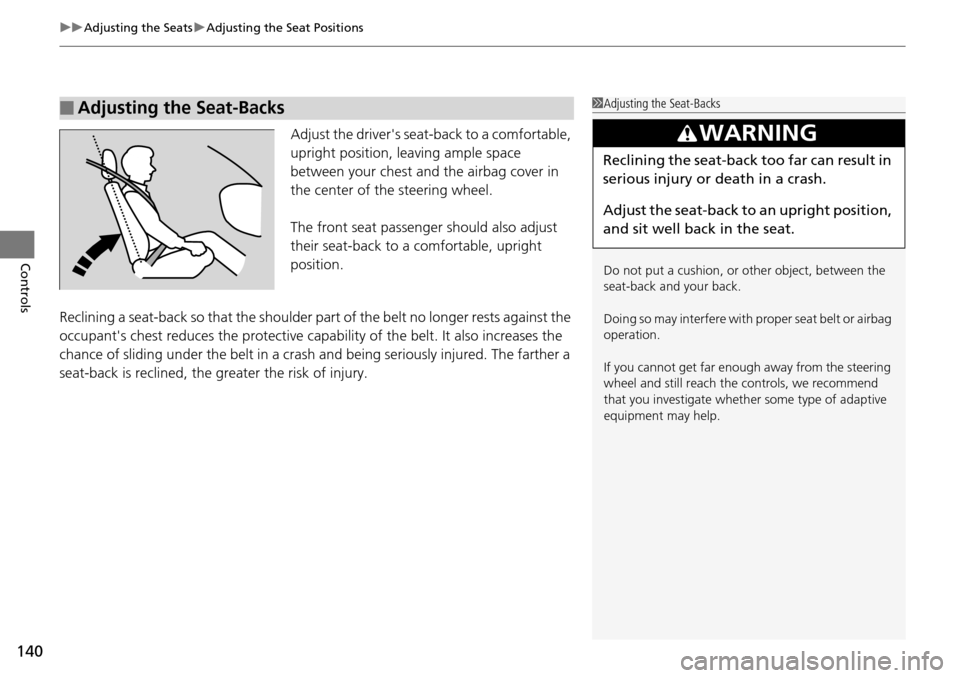
uu Adjusting the Seats u Adjusting the Seat Positions
140
Controls
Adjust the driver's sea t-back to a comfortable,
upright position, leaving ample space
between your chest and the airbag cover in
the center of the steering wheel.
The front seat passenger should also adjust
their seat-back to a comfortable, upright
position.
Reclining a seat-back so that the shoulder pa rt of
the belt no longer rests against the
occupant's chest reduces the protective capa bility of the belt. It also increases the
chance of sliding under the belt in a crash and being seriously injured. The farther a
seat-back is reclined, the gr eater the risk of injury.
■Adjusting the Seat-Backs1Adjusting the Seat-Backs
Do not put a cushion, or other object, between the
seat-back and your back.
Doing so may interfere with proper seat belt or airbag
operation.
If you cannot get far e nough away from the steering
wheel and still reach th e controls, we recommend
that you investigate whether some type of adaptive
equipment may help.
3 WARNING
Reclining the seat-back too far can result in
serious injury or death in a crash.
Adjust the seat-back to an upright position,
and sit well back in the seat.